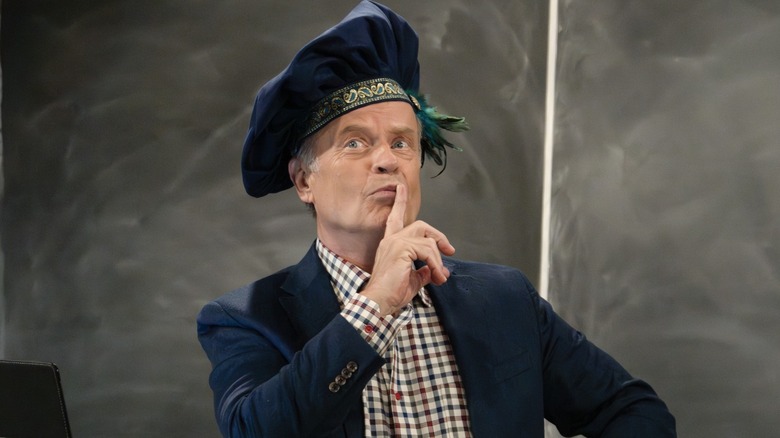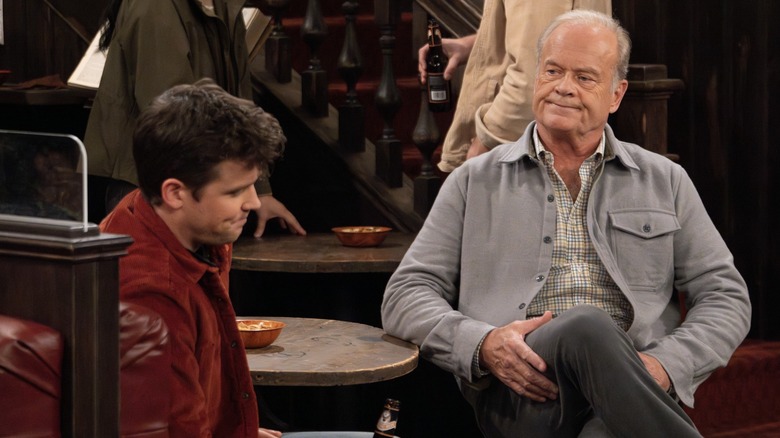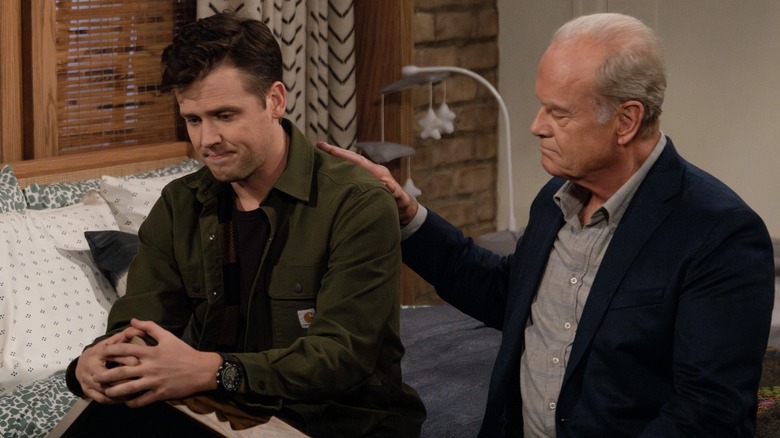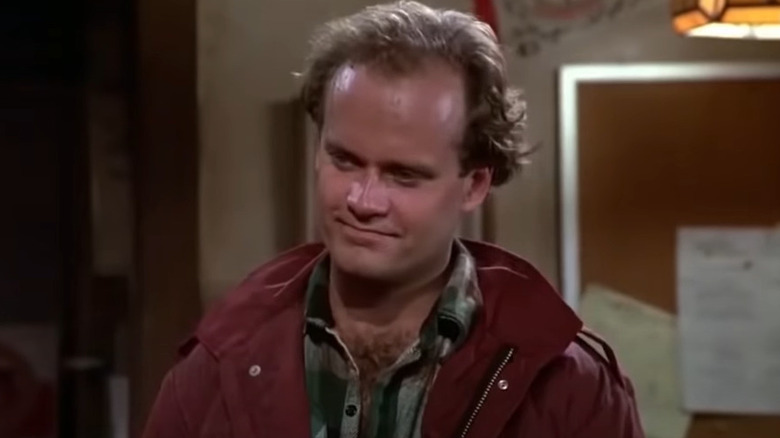Some Frasier Fans Hate Dr. Crane - And That's A Good Thing
There's one simple fact about "Frasier" that you can't dispute, both in the original series and the brand-new Paramount+ revival: its titular psychiatrist (Kelsey Grammer) is a pretentious fussbudget.
As legions of fans reunite with Dr. Frasier Crane for the first time in almost two decades, though, a surprising number of them are shocked at how unpleasant he can be. Scour the internet and you'll find viewers reporting that Frasier can be unlikable. They feel that he's a little snobby, a bit unprofessional, and rather obnoxiously obsessed with the finer things in life. They don't buy that he'd sell himself out to become a "Dr. Phil"-style talk show host, nor that his relationship with Freddy (Jack Cutmore-Scott) would deteriorate this far.
Yet clearly, people are just forgetting who Frasier is. Go back to his first appearances in "Cheers" in the 1980s, where he was introduced to the world as the possible romantic soulmate of the queen of high-class social pretention, Diane Chambers (Shelley Long). Follow his journey through the original "Frasier." Yes, he grows, and he develops, but he's still Frasier — the kind of guy whose absurd pretentiousness might swallow him alive at any moment. And if fans dare to rewatch Frasier's earlier appearances — if they allow themselves to look past the warm and fuzzy young memories of watching "Frasier" and "Cheers" when they were younger, and stop glossing over his worst actions — you'll realize that the man in the new show is, indeed, the same man as the old one.
That's not just okay, though: it's great. Because Frasier being a flawed and infuriating person doesn't just make him realistic, but also solidifies his place as one of the most iconic sitcom characters of all-time.
Frasier is fussy, arrogant and pretentious, just as he was intended to be
From his initial conception, Frasier Crane has always been the sort of guy who pronounces "sauvignon blanc" with a French accent in the middle of a fancy dinner. He's the sort of person who takes a woman to the opera for a first date, and surely nothing as pedestrian as Carmen or Medea. He relaxes by listening to classical music and doing crossword puzzles. He takes great pride in his brainpower and refuses to be countermanded by those he considers inferior. In short, he's always been a pretty high falutin' fella — and in turn, Frasier is also the sort of cringeworthy guy who bungles his romantic life, career, and family life every week.
That said, it can come as a surprise to 21st century viewers that Frasier is so arrogant. Back in 2012, one Reddit user expressed his confusion, writing, "I love this show. I have run through it multiple times on Netflix. But the more I watch it, the more I find myself hating Frasier."
In 2023, another Reddit fan started an entire thread that racked up "despicable acts" performed by Frasier. And these comments just apply to Frasier in the original series. The reboot has already inspired takes that he's a far bigger jerk today, such as Redditor Hopefulmisery commenting, "Maybe it's just to show that in this show Frasier is a bigger a****** than he was in the original series?" Over on X (formerly known as Twitter), @Joe_Senart argued that while the Frasier of the original show was a misfit, the new Frasier is more sinister, writing, "His use of status and success isn't misguided. It's manipulative and cruel."
Has Frasier really changed, though? Or does he just seem different than we want to remember him?
Frasier wasn't ever the most ethical psychiatrist (or family member)
Surely the original version of Frasier was a fantastically kind, helpful psychiatrist? Well, not really. Though the show does indicate he cares about his clients, he doesn't dole out terribly good advice. During his time on his very own sitcom, he became so notorious for his inability to dish out useful advice to his listeners that there's a common refrain among fans about him being horribly unqualified for his position. And his malfeasance wasn't just concentrated on his radio-based clients. He also sucks as a friend, lover, and family member.
Remember the time he becomes so jealous of Niles' (David Hyde Pierce) success as a fill-in host that Frasier drags himself — ill with the flu and delirious — down to the station, to oust his brother and incoherently host until he passes out? Remember how he takes over KACL's attempt at putting on a radio play and — due to his pretentions and unwillingness to listen to Niles — watches as the whole production falls apart? Remember the entire Nanny G affair? His disastrous triangle with Lana (Jean Smart) and Claire (Patricia Clarkson), which resulted in three broken hearts? The time his own high standards about the station's endorsement policy results in the entire KACL staff being fired and the station turning to an all-music channel?
And yet, to be clear, Frasier isn't a villain. He's part of a rich and beloved tradition in American sitcoms, where flawed characters have always found the love of audiences.
Frasier is no worse than your average sitcom character
When one looks back at all of the many ridiculous and even terrible things Frasier has done over the course of his televised life, one has to sit down and wonder — are his actions really worse than those of any other sitcom protagonist?
This, after all, is the same genre that later saw the controversial behavior of Michael Scott (Steve Carell) earn millions of adoring fans. Sitcoms have featured protagonists ranging from the opinionated and bigoted Archie Bunker (Carroll O'Connor), to the incredibly quirky and self-absorbed "Seinfeld" crew, to the well-meaning but childish Leslie Knope (Amy Poehler). Sitcoms are a warm house built for people who are flawed, scarred, imperfect, reactive — and thus achingly and incandescently funny.
The annals of sitcom history are absolutely layered with characters whom fans love to hate, from Ross Geller (David Schwimmer) to Kimmy Gibbler (Andrea Barber). You don't have to be a near-perfect Ward Cleaver (Hugh Beaumont) from "Leave it to Beaver" to be the sort of sitcom character that viewers come back to see, week after week. Frasier Crane definitely dances in this pantheon of icons.
Frasier's quirks just make him a real character, not a villain
Ultimately, Frasier Crane might be a pretty difficult guy, but there's an important piece missing in the current critiques of him: he's also, deep down, a well-meaning guy. A man who tries to do what's best, but just doesn't know how to get out of his own way.
He does his best to be a good father to Freddy and — while he may have lost contact with some of his old friends back in Boston – he nonetheless actually cares about the people in his life and those around him. He might be a hard guy to like sometimes, and there's no arguing that as a TV viewer it can be enjoyable to watch him struggle against the world in colorful ways, but it's all of these qualities that always made "Frasier" a great sitcom.
Frasier doesn't have to be likable to be interesting and lovable. Some sitcom characters are stubborn, ridiculous and frustrating, but fans of the genre wouldn't want them to be sweet as pie. And they'll take their Frasier bitter as a shot of espresso, but still laced with a sweet note of humanity.




